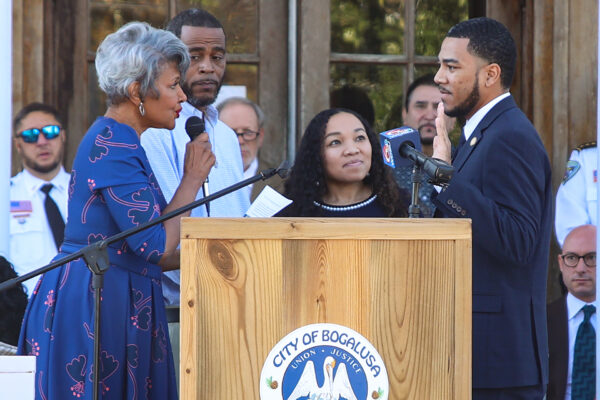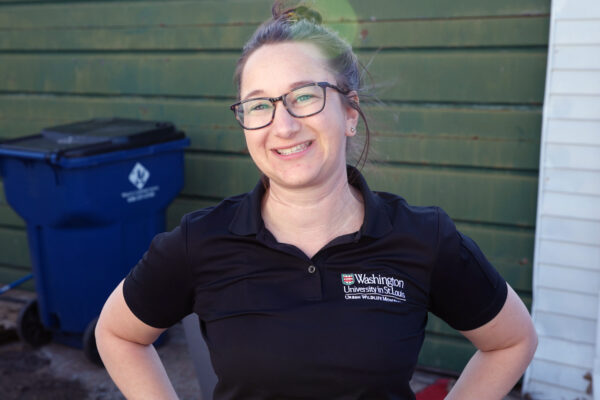It’s March 19, and Erica Barnell, MD/PhD ’23, knows her company’s position could change dramatically soon. Barnell, co-founder and chief medical and science officer of Geneoscopy, is awaiting a decision letter from the Food and Drug Administration (FDA) for approval of ColoSense, the company’s noninvasive, multitarget RNA-based screening test for colorectal cancer.
The innovative home test, which received the FDA’s “Breakthrough Device” designation in 2020, demonstrated a high sensitivity and specificity for colorectal cancer and advanced adenomas in a large pivotal clinical trial published in the Journal of the American Medical Association (JAMA) in 2023. Then in November 2023, Geneoscopy signed a multi-year agreement with Labcorp, a global leader of innovative and comprehensive laboratory services. Once the test is approved by the FDA and other milestones are met, Labcorp will offer it to health care customers, and Geneoscopy will analyze the tests in its CAP/CLIA lab.
And having another less invasive, yet more sensitive, colorectal cancer screening test on the market couldn’t come soon enough. Colon cancer is one of the most preventable forms of cancer. Yet, the World Health Organization reports that colorectal cancer is the third most common cancer worldwide and the second leading cause of cancer-related deaths annually. Known primarily as a disease that affects older individuals, colorectal cancer rates in adults under age 50 have been increasing in the past several decades. Underscoring the critical nature of this issue, the American Cancer Society recently reported that colorectal cancer is now the leading cause of cancer deaths in men younger than 50 years old and the second leading cause of cancer death for women in the same age group. The United States Preventive Services Task Force now recommends that people at average risk be screened starting at age 45.
“There are lots of barriers that prevent people from getting the screening they need,” Barnell says. “Some people live in health care deserts, some aren’t aware of the value of screening or feel anxious about the preparation you must do before the colonoscopy, some don’t have great insurance, and, honestly, some people are just busy.”
Experts agree that more than 90% of colorectal cancer deaths are preventable.
Everyone needs to be screened for colorectal cancer at some point. Over the past decade, noninvasive options such as the fecal occult blood test, fecal immunochemical test or multitarget stool DNA test have been introduced for individuals at average risk. Yet these tests are not as sensitive as a colonoscopy at detecting precancerous lesions, advanced adenomas or the presence of colorectal cancer.
“Our approach is to use RNA, which is a different type of biomarker, where we can maintain sensitivity for colorectal cancer and advanced adenomas in younger patients.”
Erica Barnell, MD/PhD ’23
“This paradigm was the impetus for founding Geneoscopy and developing ColoSense,” Barnell says. “The incidence of colorectal cancer in younger patients is on the rise. I saw an article about a woman who was recently postpartum, and her rectal bleeding was attributed to hemorrhoids from pregnancy. She ended up in the hospital with stage 4 colorectal cancer. It’s heartbreaking.”
Barnell sees Geneoscopy’s screening test as a highly sensitive and accurate option to fill a gap within the younger population. She explains that other noninvasive tests that leverage DNA methylation as biomarkers have reduced sensitivity in younger patients, because methylation is an age-related process. In short, as you age, your methylation patterns increase and, therefore, there’s an enhanced chance of genetic and epigenetic alterations.
“Our approach is to use RNA, which is a different type of biomarker, where we can maintain sensitivity for colorectal cancer and advanced adenomas in younger patients,” Barnell says. Across all patients, Geneoscopy test’s sensitivity for colorectal cancer is 94%, and test sensitivity for advanced adenomas is 46%. In the 45- to 50-year-old patient population, ColoSense showed a 100% sensitivity for colorectal cancer and 45% sensitivity for advanced adenomas; for this age bracket, the ColoSense test reported a significantly higher sensitivity for advanced adenomas relative to other molecular tests on the market.
“This is the value of RNA biomarkers,” Barnell says. “Detecting precancerous lesions in younger patients is where ColoSense can provide the biggest benefit.”
Genesis of Geneoscopy
Barnell knew from an early age that she wanted to work in translational medicine, and she can trace the idea for ColoSense back to an internship. While an undergrad at Cornell, where she studied biological sciences and applied economics and management, she’d spend summers at home in St. Louis participating in Washington University’s Advanced Summer Program for Investigation and Research Education (ASPIRE). When WashU states that undergraduates can conduct research with leading faculty, it’s not hyperbole. Through ASPIRE, Barnell worked with esteemed Washington University School of Medicine faculty like Mark Manary, MD, the Helene B. Roberson Professor of Pediatrics, and Phillip Tarr, MD, professor of microbiology and the Melvin E. Carnahan Professor of Pediatrics, developing non-invasive technology to diagnose environmental enteropathy. An intestinal inflammatory disease, environmental enteropathy afflicts children in developing countries. Not being able to scope these children from St. Louis, researchers asked moms from Malawi to send them children’s diapers so they could use the stool samples to diagnose disease.
“That research effort was very successful, and I developed a lot of skills,” Barnell says. “When I matriculated to WashU’s MD/PhD program in 2014 and started seeing some of the gastrointestinal diseases that are more frequent in the clinic here — colon cancer, inflammatory bowel disease, and celiac disease — I had the idea we might apply this same technology to these disorders.
While still a student, Barnell leveraged the resources available to her in WashU’s Medical Scientist Training Program (MSTP) to co-found Geneoscopy.
“The entrepreneurial spirit here is what drew me to WashU’s MSTP program in the first place,” Barnell says. “Seeing numerous inventors, entrepreneurs and physician-scientists achieving remarkable feats is incredibly inspiring. It’s easy to think, ‘I could do that too.’”
Barnell states that being a mentee of Obi Griffith, associate professor in the Division of Oncology at the School of Medicine, whose research to advance precision oncology using bioinformatic tools and computer science, was instrumental to her advancement as a researcher. And she emphasizes that it’s the entire collaborative and encouraging ecosystem at the university that put her on solid footing.
“WashU is a huge powerhouse for biomedical entrepreneurship, and having that infrastructure — the Skandalaris Center — in place expedited my journey and allowed me to form the company.”
Erica Barnell, MD/PhD ’23
“WashU is a huge powerhouse for biomedical entrepreneurship,” she says, “and having that infrastructure — the Skandalaris Center — in place expedited my journey and allowed me to form the company, even though my educational training wasn’t nearly complete at the time.”
As a first-year medical student, Barnell went through WashU’s Sling Health incubator, a national student-run nonprofit founded by medical students at WashU to confront unsolved clinical problems.
“At one point, they asked me to put together pro forma financial statements, which I had to Google. Then I called my brother,” Barnell says. At the time, Andrew Barnell, who now serves as Geneoscopy’s chief executive officer, was in the MBA program at Wharton for health care entrepreneurship after working two years in investment banking as a J.P. Morgan health care analyst and two years at Lindsay Goldberg as a private equity associate. “He leveraged some of his coursework to help me, and it soon became apparent that we worked well together,” she says.
Almost eight years into their partnership, the future is bright for the dynamic duo and the more than 50 employees they now have working at Geneoscopy, which is housed in an 11,000-square-foot CAP/CLIA laboratory in the St. Louis suburb of Maryland Heights, Missouri. Together, they’re applying their proprietary RNA-based technology not only to colorectal cancer but to other gastrointestinal disorders as well. Geneoscopy is developing diagnostic tests for treatment selection and therapy monitoring in inflammatory bowel disease (IBD) — Crohn’s disease and ulcerative colitis — in partnership with leading universities, including Washington University, as well as biopharmaceutical companies.
In late 2023, Geneoscopy announced a strategic collaboration with Adiso Therapeutics in Concord, Massachusetts, to support new therapeutic options for patients with IBD. “They’re going through FDA clinical trials now,” Barnell says, “and, preliminarily, we’ve been able to demonstrate the potential to predict which patients are going to respond to their drug and, more broadly, predict which therapy would be most efficacious for a patient with IBD.”
In January 2024, Geneoscopy formed a scientific advisory board, comprising leading physicians in IBD, and they’re providing important strategic input, Barnell says.
“I’m excited to see how we can apply this technology to other diseases.”
Erica Barnell, MD/PhD ’23
During initial meetings, they recognized the true value in two aspects of our technology, says Barnell. The first is the potential for Geneoscopy’s technology to accurately assess the severity of disease for patients with IBD, and the second is the possibility of predicting the therapeutic response, which could be a true game-changer.
Barnell says at the end of the day, she’s a data junkie who loves discovering new science, creating solutions and solving problems to improve health outcomes. “Looking ahead, we now have a massive biobank that we can leverage to iterate on the next-generation ColoSense test. We strive to improve our test’s performance for providers and patients – even beyond the excellent results published in our JAMA manuscript,” she says. “I’m excited to see how we can apply this technology to other diseases and possibly other gastrointestinal cancers.”
“I want to keep pushing the bounds of this technology.”


